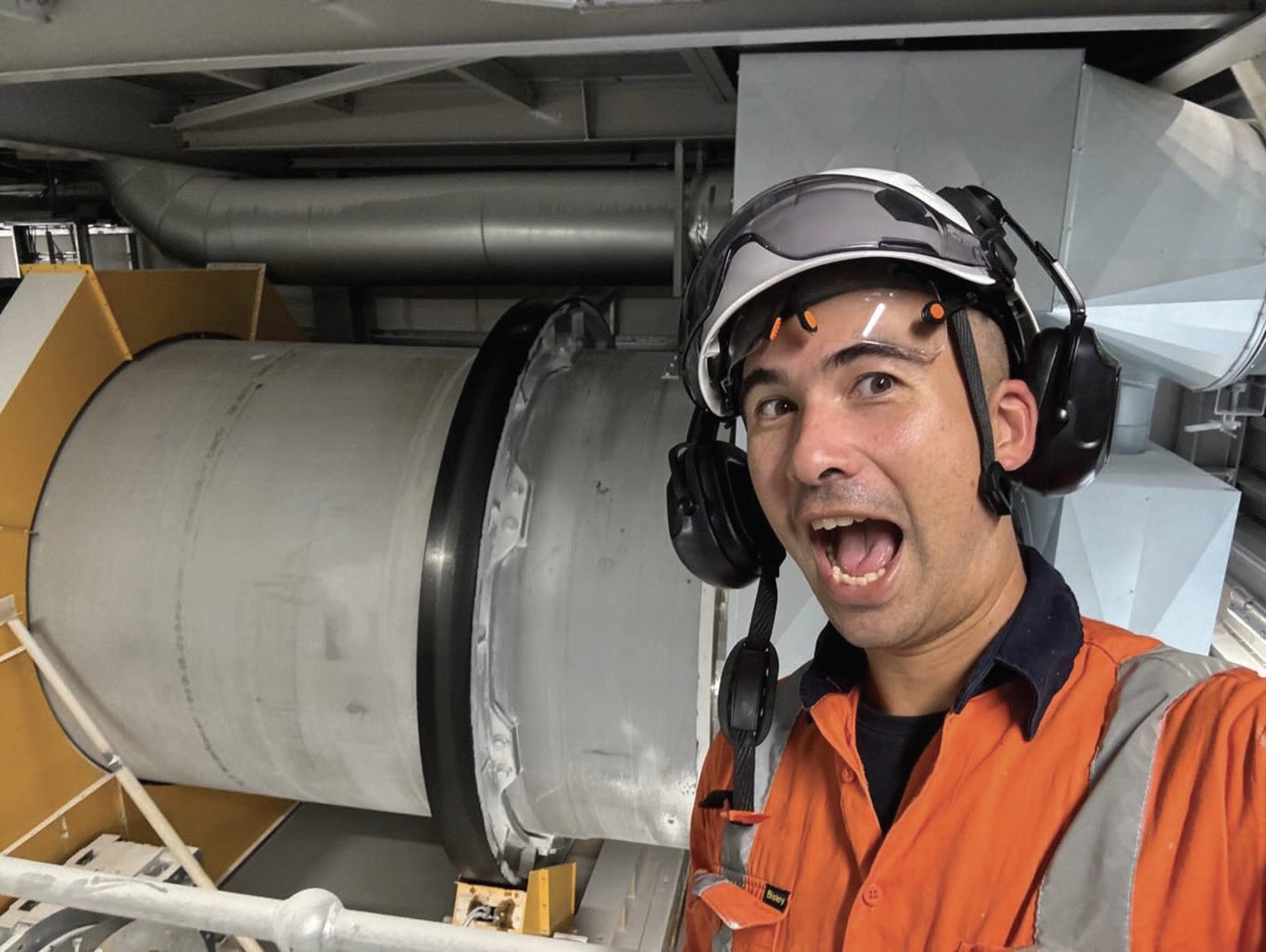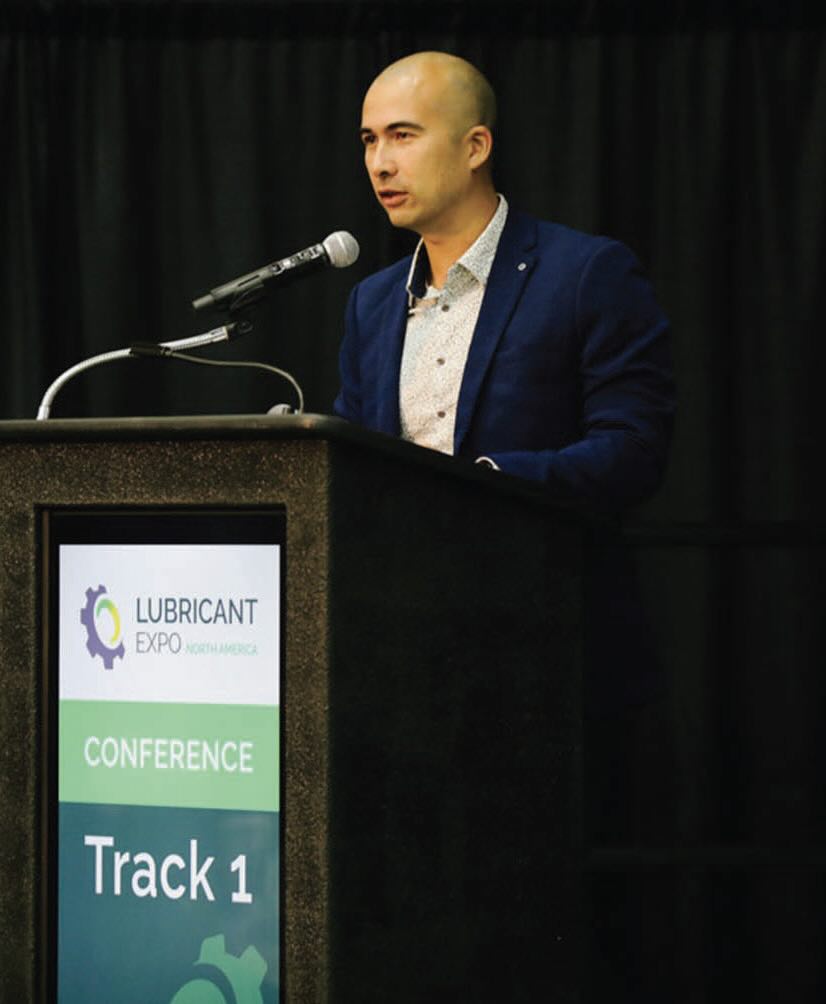TLT: How long have you worked in a lubrication-related field, and how did you decide to pursue a career in the lubricants industry?
Britton: I’ve been in the industry for eight years now. Prior to that, I was working as a drilling engineer for ExxonMobil, so I come from an operations engineering background. As exciting as that job role was, the projects tended to be in far-flung locations, so when we were about to have our first child, I wanted to take a role closer to home. Fortunately, my boss was able to do some hunting internally and found me a role in the downstream part of the company. I can still remember the day he came into my office and asked, “How would you like to be a lubrication engineer?” to which my answer was, “What the --- is a lubrication engineer?”
I took the role completely blind and haven’t looked back. I think that’s a pretty common thread among people in our corner of the industry. I’ve asked many people how they arrived in our neck of the woods, and the answer seems to always split one of two ways—either it’s a family business, or they fell into it by accident. It makes sense though—I don’t think there are too many people that grow up with dreams of becoming lubrication engineers!
TLT: Your use of social media and video content is unique in the lubricants industry; do you think this communication model is the future of our industry?
Britton: Absolutely! Although I’m a little biased. Again, there was no grand plan here—during the pandemic there was a lot of demand for online webinars and the like. One thing I found was that I was delivering the same content over and over, and that seemed like a waste of time. Far more efficient to record the webinar once and upload it to YouTube where people can watch it in their own time. The channel ended up gaining a bit of momentum, and I just kept adding more and more videos.
Personally, I think it’s a great way to connect with other professionals now that our industry has become so global. I’ll always have a soft spot for in-person events because nothing can ever replace that experience—but sometimes there are geographical or language boundaries. YouTube solves a lot of that—especially now that multi-language audio support has just been added to the platform.
It’s also a way to connect with a slightly younger demographic. If you compare my YouTube audience data with industry data, it tends to skew a lot younger. That’s a promising sign, as educating the next generation is one of our industry’s priorities.
It’s also a way for us to show our value to the customers that are further down the value chain. Sometimes I feel that our industry does so much good work that goes completely unnoticed. YouTube (and other social channels) are a really effective way to peel back the curtain and show the world the effort and complexity involved in bringing solutions to market.
TLT: What advice would you offer early to mid-career professionals in our industry looking to gain faster knowledge transfer as late career professionals continue to retire at faster and faster rates?
Britton: This is shaping up to be the big challenge that our industry faces in the coming decade, and I think it’s going to require various solutions to get it done.
First up, find a mentor. I’ve found a consistent theme across the industry that there’s a senior professional in every business who has been in the role for decades and knows where all the proverbial bodies are buried. Attach yourself to that person and learn as much as possible. If you’re unable to do that, my podcast, Lubrication Experts, is a good facsimile where you can learn from some of the best in the business.
Secondly, uncover how you learn best and then gain as much exposure to that as possible. For some people, it will be online learning, for others in-person. Some will want to experiment, and some will need time in the field. Once you’ve found your preferred method, find a way to do as much as you can.
Finally—network. I’m pretty open with my clients that I don’t know all the answers, but I generally will know someone that does. Collective knowledge is pretty powerful. I’ve found that almost without exception people in our industry are very generous with their time and their knowledge.
 Rafe Britton completing a gear inspection at a cement plant.
Rafe Britton completing a gear inspection at a cement plant.
TLT: Throughout the different segments within your career, which one has been the most interesting, challenging and/or rewarding?
Britton: As far as market segment goes, I’ve got a soft spot for gas engines running on landfill and biogas. Internal combustion engines (ICEs) continue to fascinate me, so when they’re big, powerful and running on contaminated gases there is so much scope for optimization. There’s so much that is going on in terms of formulation and condition monitoring, and there’s now some cool filtration technologies that I’ve been playing with to extend oil and equipment life. Plus you get the satisfaction of doing something that’s great for the environment.
As far as career “era” goes, I’m really enjoying my time as an independent consultant. It’s certainly not for everyone—I do miss the structure of working for a large corporate, but at the same time I’m free to pursue whatever interesting project I can get my hands on.
TLT: What are some of the most technical lubrication-based concepts or topics you have encountered throughout your career?
Britton: I think the discussion around white etch cracking is a fascinating one. There’s a long history of this failure mode, but a lot more focus now that we’re seeing its prevalence increase, particularly in wind turbines. Pinpointing the cause, then devising standardized ways to test for it, is such an interesting challenge for our industry, and I’m excited to see some new additive technologies that might be able to address it for us.
Varnish is probably the other obvious one. As a failure mode it has really come to the fore in the last decade or so, but there’s no single cause. It’s a combination of operating factors, formulation chemistry, changes to the design of turbines and hydraulic and even changes in the base oil market. Integrating all that information, then using cutting edge oil analysis methods to identify the issue, and filtration technologies to address it—that to me is such an interesting challenge.
Those challenges are also really rewarding, because it’s a chance for our industry to really show its value. Sometimes we make “minor” changes like updates to engine oil specs, and the customer doesn’t really notice the changes—even though it was a herculean effort by the industry to get them through. With varnish and white etch cracking, it’s a pressing failure mode that is causing our customers a great deal of operating and financial grief. When we assemble the combined knowledge and capabilities of the industry to solve the problem, it’s hard to ignore.
 Rafe Britton speaking at the Lubricant Expo North America.
Rafe Britton speaking at the Lubricant Expo North America.
TLT: What is the one thing you wish you would have learned earlier in your career?
Britton: I wish I’d learned to draw on a wider toolbox of skills. I think early on, I looked at engineering problems and was too narrowly focused on the problem-solving methods that I’d been taught in that field. As the saying goes, when all you have is a hammer, everything looks like a nail.
I’ve found a lot more success in drawing from disparate experiences. So for example, I’ve done a bit of volunteer work doing data analysis for the local cancer hospital where my wife works. It turns out, a lot of the statistical techniques that are used in longitudinal studies in healthcare trials are really relevant for processing oil analysis data for fleets of engines. Who would have thought?
I’ve also been able to apply the animation skills that I learned as a school student into my online learning modules to make them more engaging. People seem to respond better when you’re not a one trick pony.
You can reach Rafe Britton at rafe@lubrication.expert.